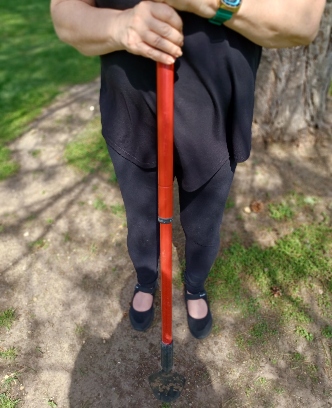How (and Why) I Garden With MS
One constant feature of living with MS is that my body rebels every time I move. This could keep me from doing the things that mean the most. Gardening is a ritual that means the world to me, not only because it is my passion, but because it helps me travel a better road on my MS journey. Here’s why.
Gardening helps manage my MS
So many things are tied up in this ritual. My mother gave me my first little plot of dirt in the backyard as a seven-year-old. She gave me lettuce and zinnia seeds to sow, a few instructions on how to do it, and off I went.
Sixty years later, I am designing hardscapes and placing assorted perennials and annuals in sophisticated settings. Gardening is my mother’s legacy, as well as that of her mother. Each time I grab my cane and stoop over a mound of lilies, I invoke the mitochondrial tillers of my DNA. I only wish they could see the paradise I have created. Maybe they do, on some plane.
But gardening is not just my destiny. It is also my pleasure. I am a writer, so I can create a story and characters that emerge from the ether. Designing a beautiful garden is another outlet for my urge to create something out of nothing. Gardening serves yet another purpose, too, and this came as a surprise. As difficult as it is, it actually helps manage my MS. It didn’t at first, though. That was a long time coming.
Initially, it was challenging
Spring garden clean-up, planting, watering, weeding, feeding, deadheading, and pest control were all a big effort when I was able-bodied. Soon after my first MS event, I felt defeated.
I was able to maintain two big containers of annuals that flanked the front entrance of my mother’s house where I lived when I was diagnosed, something that was easy to plant and easy to water every day. I regained most of my strength, but I was never the same. I had an MS relapse five years later and again bounced back, but with some permanent damage.
When I moved into my boyfriend’s house three years later, I was given carte blanche to landscape his home. With his help, I created beautiful spaces. But I struggled to maintain them. He wasn’t much into gardening himself. I did the best I could, weeding, mowing the lawn, transplanting, and watering.
A year later I had another MS relapse. This time, however, I was left with significantly more disabilities. I could do little more than water. My legs became so weak that I couldn’t make it through a grocery store trip. He divorced me soon after. After the divorce I moved to where I am now, a garden apartment in a senior community. And here is where my fortunes changed.
When things changed
In 2013, I began taking Ampyra, a new drug designed to help MS patients walk faster. It did that for me and more. It strengthened my legs and improved my endurance. So when I began laying in my garden, I discovered that I could stand for longer periods and, by taking regular breaks, work outside for a pretty good stretch.
That was nine years ago. Every spring, summer, and fall since, I have gotten outside every day and unwound the hose, watered, refilled the bird bath, pruned a rose vine, pulled a weed here and deadheaded a lily there, and wound the hose back on the caddy again. I can step back and take pride in my work, still the master of my domain. It’s good to be the king!
And how does gardening help me manage MS? Exercise keeps me strong, which in turn keeps me able to remain active. Activity significantly reduces my pain as well. Did you know that intentional activity can release endorphins?1 This is another way gardening helps me manage MS. Activity + endorphins + doing what I love = a happier, healthier Kim.
Featured Forum
View all responsesTools that I use to help me
What happens when the season ends? During the cold months, I do a different kind of intentional activity. I walk the halls every day for 30 minutes to maintain my strength and endurance until spring arrives. Then I get to create beauty and bliss all over again.
Beauty feeds my soul. Self-reliance feeds my pride. As able as I am, however, I struggle against wonky balance, lack of coordination, and weak ankles and legs. I found some useful tools that help.
I think a long-handled trowel is a must-have for people like us. Having to crouch or go down on hands and knees to do a task is asking for trouble. A long-handled trowel allows me to bend over a bit and dig out a weed.

Another tool is a wheeled cart that you can sit on. You can push yourself along the edge of a plant bed and remain seated while you bend forward and work the plant bed. A similar item is a bench that is not on wheels but is lightweight enough to pick up and move. There are several different versions of these and pricing ranges from $40 USD on up. You can find them on Amazon, and at Walmart, garden centers and big box stores.
Tips for making gardening easier with MS
Finally, I have a process for planting patio pots that I call assembly line planting. You do it seated, and with a minimum of movement. See a demonstration video on my YouTube channel "The Disabled Gardener."
Have any tips of your own for making gardening easier? Please share them!
Happy gardening!
Hugs, Kim

Join the conversation